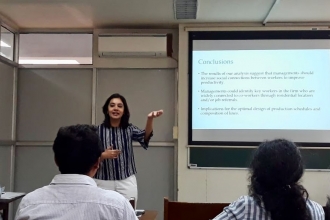
Women in the Economy Workshop 2020
Workshop Summary : As the world adjusts to the new reality brought on by the Covid-19 pandemic, the workspaces of the future may look very different from what they are today. How would these changes…

Workshop Summary : As the world adjusts to the new reality brought on by the Covid-19 pandemic, the workspaces of the future may look very different from what they are today. How would these changes…

Organized by ISI with the support of IWWAGE The annual workshop to study the role of women in the economy was conducted by ISI in collaboration with the The Initiative for What Works to Advance Women…
Presented By: by Kanishka Kacker (Indian Statistical Institute – Delhi) Abstract: There has been much discussion recently in the U.S. press about the fate of coal mining and its employees…
Presented by: Rashmi Barua (Jawaharlal Nehru University) Abstract: We study the effect of exposure to arsenic in groundwater, the main source of arsenic contamination, on a range of education outcomes…
Presented By : Isha Zaveri (World Bank) Abstract : The fallout of nitrogen pollution is considered one of the largest global externalities facing the world, impacting air, water soil and human health…
Presented by: Dr. Louis Preonas, University of Chicago Abstract: In the United States, demand for electricity among utilities in the wholesale spot market is assumed to be perfectly inelastic…
Presented by: Prof. John Hassler, IIES, Stockholm University Abstract: We construct an integrated assessment model with multiple energy sources – including fossil fuels and “green energy” – and…
Presented by: Prof. Randall Bluffstone, Portland State University Abstract: This paper uses a field experiment and real-time electronic stove use monitors to evaluate over a period of more than one…
Speaker : Prof. E. Somanathan, Indian Statistical Institute, Delhi Discussants : Dr. Ajay Mathur, Director General, The Energy and Resources Institute. They were followed by Shri Ajay Narayan Jha…
This study analysed the impact of the 2012 flood that occurred in Nigeria on households’ chance of entering into poverty, using a panel analysis of covariance model and data from the Nigerian General Household Survey of 2011 and 2013. The result of the analyses showed that though the 2012 flood did not significantly affect the per capita expenditure of all the surveyed households, it may have significantly decreased the per capita expenditure of households located in the flood affected areas and were heavily dependent on agriculture for their income.